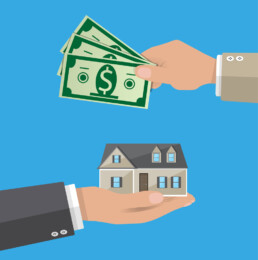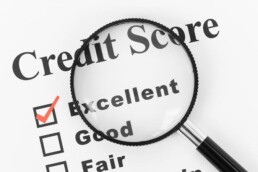10 Questions to Ask Your Mortgage Lender
One of THE MOST important stages in the home-buying process is finding a reputable lender or mortgage broker to handle your transaction. A good lender will respect that you work hard for your money — and you want to spend it wisely.
After running a credit check, your lender will present you with options for what you may qualify to borrow. The mortgage amount can be different depending on two things: the product and interest rate. Since the interest rate determines what you’ll owe every month on that balance, understanding how different mortgage products work is key. Here are 10 questions to ask to make sure you’re getting the best rate (and the best deal).
- What is the interest rate?
Your lender will offer you an interest rate based on the loan and your credit. The interest rate, along with the mortgage balance and loan term, will determine your real monthly payment. A loan with a lower balance or a lower interest rate will make for a smaller monthly payment. If you’re not satisfied with the interest rates offered, work to clean up your credit so you can qualify for a lower interest rate.
- What is the monthly mortgage payment?
As you develop a budget for your new home, make sure you can afford this monthly mortgage payment — and be sure to include insurance and taxes in your monthly payment calculations. And don’t forget about short-term financial goals — say, saving up for a vacation or buying a new computer — and long-term retirement goals to consider. Your monthly mortgage payment shouldn’t be so high that your money can’t work toward your other financial goals.
- Is the mortgage fixed rate or an ARM?
Fixed-rate loans keep the same rate for the life of the loan, which can range between 10 and 30 years. Adjustable-rate mortgages, or ARMs, have interest rates that change after an initial period at regular intervals. If you don’t plan to stay in your home long-term, a hybrid ARM with an initial fixed-rate period may be a better choice, since this type of loan tends to have lower interest rates than fixed-rate mortgages.
If you do consider an ARM, make sure you ask (and understand!) when the rate will change and by how much. Ask how often the rate will change after the initial interest rate change, the index that it’s tied to, and the loan’s margin. There are usually caps to how much the interest rate can increase during one period and over the life of the loan, so recalculate the monthly payment to make sure you can afford that higher rate.
- What fees do I have to pay?
One-time fees, typically called “points,” are due at closing. For every point you pay, your lender will decrease your interest rate by 1%. You can also inquire about whether you might have the option of paying zero closing fees in exchange for a higher interest rate.
- Does the loan have any prepayment penalties?
If you’re saving up to make some extra mortgage payments to pay off your mortgage principal early, you may have to pay a fee. Don’t forget to ask this important question.
- When can I lock in the interest rate and points, and how much does this cost?
Your lender may be able to lock in your interest rate for a time, and for a fee. If rates go up, you’ll still be able to benefit from a lower rate on your mortgage.
- What are the qualifying guidelines for this loan?
The underwriting guidelines are different for every loan, as are income and reserve requirements. Along with requiring you to have sufficient funds for the down payment and closing costs, most mortgages require proof of income and reserves of up to six months of mortgage payments.
- What is the minimum down payment required for this loan?
Different loan products have different down payment requirements. Most mortgages require a 20% down payment, but if you qualify for an FHA loan, for example, your down payment could be as low as 3.5%. In general, loans with lower down payments cost more.
- Do I have to pay for mortgage insurance, and how much will this cost?
Putting down less than 20% on your purchase requires paying mortgage insurance until your loan-to-value, or LTV, ratio falls below 80%. Mortgage insurance premiums can be expensive, sometimes costing up to $100 per month for every $100,000 borrowed.
- Do you have other mortgage products with lower rates that I qualify for?
The best way to comparison-shop is to start with your current lender. They probably offer more than one type of loan, and these may have terms better suited to your financial situation.
6 Ways to Buy a Home Even if You Think You Can’t
There are many obstacles when buying your first home. It takes diligent work, and to say the least it is expensive. Especially when you consider the rise of real estate and interest rates. Here are six issues that I am sure you have heard will get in your way. However, I have good news for you, there are ways around them.
- The big 20% down payment
The standard in buying a home is 20 percent money down, which means a lump sum of 20% of the purchase price paid upfront. On a 300,000 house, the down payment would be at $60,000, which is definitely not pocket change. Putting down 20% will allow you to have a lower mortgage and monthly payments. However, according to the National Association of Realtors, 81 percent of Americans purchased their first home with less than 20 percent down to as little as 3 percent. Here are some alternative options to come up with a down payment that would get you near the 20% percent mark. One option is to go to your family and ask for a gift. You can get up to $14,000 tax-free money from your mom, dad, and even your grandparents. If all 4 of them decide to bless you with a gift, that is $56,000 tax free money that can go towards your down payment.
Another option that many people take advantage of is borrowing against their 401(k) or IRA. You are able to borrow up to $50,000, or 50% percent of your plan. First time homebuyers may qualify to take up to $10,000 from their IRA without having to pay early withdrawal penalties.
Now let’s say with all of that, you still don’t have enough money. If you have always dreamt of having a big lavish wedding as a child, you can always skip out on asking for that fancy blender and new 70-inch TV, and request money from your guests instead.
Another possibility is to completely skip on having the big wedding in general, and maybe opt to have something smaller and more intimate. This will surely save you a lot of money that you could be putting down on your first home.
- Bad Credit
This might be the biggest obstacle of all when buying a home. The lower a credit score, the higher the interest will be or you might not even qualify at all. The best thing to do is to clean up your credit as much as possible, pay your bills on time, and consult with a mortgage broker for suggestions on how to improve your score. A few things that a mortgage broker will tell you is to not incur more debt. Hold back on purchasing a new car and completely avoid opening up new lines of credit. Lastly, know your credit score inside and out. According to the National Foundation of Credit Counseling, 42% percent of Americans have not checked their credit score in at least 12 months. The two most important credit scores you need to know are 620 for the Federal Housing Administration for your insured loan, and 720 for a conventional loan.
- Knowing your price range.
A standard rule to determine your first homes price range is to figure out how much you can afford each month. Lenders say your PITI (principal, interest, taxes, and insurance) should not be more that 28% percent of your income before taxes. Some banks will go up to 33% percent which means if you earn $5,000 per month, the maximum PITI payment the lender will allow is $1,650 a month. Banks are looking for your back-end ratio; the sum of your PITI payment and all revolving debit (credit cards, car loans, all other loans you carry), which should be no higher than 41% to 50% percent of your gross monthly income.
- Fear of a bad loan
For many years a 30-year mortgage with a fixed interest rate was the only option. In recent years the industry has changed exponentially and developed new programs to help more people become homeowners. Some loans begin with a low interest rate and adjust upward by a certain percentage about every year. Many people choose to go with a low interest rates at the beginning of the loan and sell the house for income before the loan adjusts. Consult with your mortgage broker to find out what will be the best for you.
- Where to begin
Some first-time buyers think spending hours on Zillow and going to every open house is the best way to start; but its not. The best way to begin is to get educated. Fannie Mae and Freddie Mac both offer classes and a lot of information on their website that can support you through the process.
Some basics:
Real estate brokers work on a commission base, typically around 6% percent. There is no need to pay any fees upfront to an agent for them to help you walk into a house to check it out. If and when the property is sold they will get paid.
A house on the market for a long time does not necessarily mean it has any serious flaws. The seller may have an unrealistic expectation of the value of their home, or it could be something else. Don’t be afraid to offer lower and let your agent negotiate on your behalf.
You will see that every home will come with some type of issue large or small.
Unless you’re buying a brand new home, you should expect some fixing up to do. Now it’s up to you to decide the extra costs are worth buying the home.
- The offer is made and now I’m scared
You found the home of your dreams and you make your offer. This offer should come with at least two contingencies. 1. You’ve had the chance to have a private professional inspector come out and look at the property. If the inspector finds issues that are out of your budget to fix, you can always negotiate the purchase price or walk away. 2. Your offer is based on the ability to pay for the property. If for some reason you are not able to pay then you can simply walk away. After all negotiating is said and done, you and the seller will go into a process called escrow. That is where a third party will make sure all of the legalities are in excellence before completing the sale. Escrow will handle the money components, and seal the deal between you and the seller. Congratulations, you are now a first time homeowner!
Now that you know what it really takes to achieve the American Dream of homeownership, give us a call and we'll walk you through the process in no time! 702-331-8185
5 Ways to Use a Mortgage Calculator
Whether you’re hoping to buy or planning to sell, a mortgage calculator can give you some valuable insights. Here are five questions a monthly mortgage calculator can help answer to make you more savvy about home buying.
Should you rent or buy?
There’s more to being a homeowner than just swapping a rent payment for a mortgage payment. You’ll have to consider additional costs like property taxes, and depending on your loan, you also may have to factor in fees like private mortgage insurance (PMI) — all of which can be estimated by a mortgage calculator. It’s a good way to compare the total cost of renting with the realistic costs of buying.
Is an adjustable-rate mortgage (ARM) right for you?
One way to keep a mortgage payment down and still get the house with all the bells and whistles is to choose an adjustable-rate mortgage with an interest rate lower than a fixed-rate loan’s. There are some risks involved, however: With an ARM, your payment could spike if the interest rate adjusts. With a mortgage calculator, you can see how interest rate assumptions can impact your monthly payment, and the total interest paid over the life of a loan with an ARM versus choosing a fixed-rate loan.
Can you cancel your PMI payments?
Private mortgage insurance is an additional cost for most buyers who don’t put down at least a 20% down payment. To stop paying this fee every month, you must owe less than 80% of the value of your home. You could qualify by either paying down your loan or seeing enough appreciation in your home to meet the threshold. A monthly mortgage calculator can help compare your home value with the loan amount and determine when you meet the requirements to request cancellation of your PMI payments.
Can you afford to pay off your mortgage early?
To find out, use a loan calculator to play around with the numbers. Plug in your original loan amount, interest rate, and date the loan was issued. Then include the amount you think you can add to your current monthly payment to determine how quickly you might be able to own your home outright.
Should you refinance?
A lower interest rate is usually a good thing, but depending on the amount you owe and the time remaining in the life of the loan, refinancing may end up costing you more than staying the course.
If you would like answers to these questions and more without using a mortgage calculator, contact my office at 702.331.8185.
The Top 5 Most Common Refinancing Misconceptions
When it comes to refinancing your home, there are a few misconceptions that many people have. Before you rule out the possibility of refinancing your home, you might want to learn why it may be easier than you think.
Some of the most common refinance misconceptions are not having enough equity, not being able to afford the refinance, or that it simply doesn’t make sense because of high interest rates.
Regardless of why you think you wont qualify to refinance your home, don’t let what someone told you stop you from taking advantage of some of the great benefits it can provide such as lowering your monthly payment, cashing out to consolidate debt, or getting a lower interest rate.
Here are the most common myths when it comes to mortgage refinance:
- I don't have enough equity in my home
Most refinancing programs require you to have at least 20 percent equity in your home to qualify. However, new federally chartered programs make it possible for homeowners with little or no equity to refinance their home and take advantage of the benefits that comes along with refinancing. The federal program is called Home Affordable Refinance Program, or HARP, and it has helped many homeowners with low equity reap the benefits of refinancing. Just like any mortgage program, you must meet certain requirements before you can qualify, but if this sounds like your situation, a federally chartered program, such as HARP, may be able to help.
- I can't afford it
Just like any mortgage or refinance program, there are lending fees involved for processing the loan. The fees vary based on the lender, but the average cost is about 1.5 % of your total loan value. For example, if you have an estimated loan balance of $300,000, you will be required to pay $4,500 in fees. That may seem expensive, but don’t worry, most lenders will let you add those fees to the total loan balance and let you pay over time through your monthly mortgage payment.
- I was turned down before, so there's no reason to try again
Were you recently rejected for a mortgage application? Don’t give up just yet. Just because you were rejected in the past, doesn’t mean that you won’t ever qualify. If your financial situation has changed since you last applied, then there’s a chance you could qualify. Most applicants get rejected because of low credit, low income, or too much debt. However, if your financial situation changed, then you may be able to qualify. For example, maybe you got a raise at your job, raised your credit score, or paid off a good amount of debt. A change in any of these factors could get you one step closer to qualifying for a refinance program.
- It's easier to refinance with your existing lender
Many people think that refinancing with the lender that did your original loan is the best option. However, this is not always true. Lenders have different fees, interest rates, and programs that could be better for your situation. Even though you gave your financial documentation to your original lender when you did your first loan, you will still be required to resubmit new documentation that represents your current financial situation such as job status, income verification, bank statements, and credit score. So, the process to refinance your home won’t necessarily be easier with your original lender because you worked with them in the past. You are free to work with any lender you choose and there are many lenders in any given community, so it is smart to shop around and find the one that works best for you
- Interest rates are too high to make refinancing worthwhile
With talks about the rise in interest rates, you might think it is not a good time to refinance. However, in the mortgage industry, things are constantly changing. Regulations, loan limits, and interest rates can be different on any given day so it is smart to talk to a lender and find out what the current state of the industry is. When you secured your first loan you were locked into the interest rate that was available at that time. It might not seem like a significant change, but if you are able to lower your interest rate a full percentage point, it could save you a significant amount of money on your monthly payment when you refinance. There are also benefits of refinancing your mortgage to a shorter term so you can save more money long term on interest and pay your loan off faster. For example, if you refinance from a 30 year fixed rate mortgage to a 15 year fixed rate loan, you could reduce the amount of interest on the loan by $100,000 or more. Your monthly payment will be higher, but your interest rate and total interest owed over the life of your loan will go down.
If you are a homeowner and you're interested in refinancing your home, give us a call and we will guide you through the process! 702-331-8185
What is a Cash-out Refinance?
What is a Cash-out Refinance?
A traditional mortgage refinance is when an existing loan is replaced with a new loan and a new set of terms, in many cases with a lower interest rate. A cash-out refi replaces your existing mortgage just like a traditional refi, but the homeowner gets cash distributed. It also differs from a home equity line of credit which allows you to borrow cash using the equity of your house but it functions as a second mortgage.
Common reasons to go with a cash-out refi are:
- Paying off Credit Cards
- Financing a Business
- Covering College Tuition
- Managing Unexpected Expenses
- Making Improvements to your home
- Taking advantage of potential tax-deduction benefit from interest paid on loan
Using the equity of your home is a great way to access cash when you might need it for something else that comes up. However, having goals for what you are going to be spending that money on is the most important thing you can do to set yourself up for success. For example, going and using that money to purchase a brand new luxury vehicle might not be the smartest decision, but using that money to pay off other debts could be extremely beneficial.
Most popular cash-out refinance options:
Conventional Cash-out: This is available to qualified homeowners who have more than 20% equity in their homes.
FHA Cash-out: Is available to homeowners who have more than 15% equity in their homes.
VA Cash-out: Is available to homeowners who are US Veterans or currently an active service member. Often a VA Cash-out allows you to use even more of the equity from your loan.
Is Cash-out Refinancing Right for me? Here are some questions that are good to ask yourself.
Do you have enough equity in your home?
Maximum loan to value (LTV) ratio for a conventional and FHA range from 70% to 85%, as for VA the maximum is 100%. This means you will need more equity in your home to have a larger amount when cashing out from the refi.
Does it affect my monthly payment?
Cash-out refi does increase the total loan amount so your monthly payments will often increase as well.
Can an FHA loan be eligible for cash-out refinancing?
Yes, if you have an FHA insured mortgage you may qualify, but refinancing into a conventional loan may be better because it does not require mortgage insurance.
What are my options as a US veteran?
As a US veteran your cash out options may be eligible as a cash-out refinance with great rates and the flexibility to borrow up to 100% of the total value of your home.
Are there any additional costs when cashing out?
Yes, when you refinance there are closing fees that you will be responsible for. These costs can also include escrow fees, an appraisal, and upfront private mortgage insurance fees.
Am I required to have mortgage insurance?
Conventional loans - No
FHA loan - Yes, you will pay an up-front and annual insurance.
VA loan - Yes, you will pay a funding fee.
What are the requirements for a cash out refi?
- Pay Stubs
- Tax returns/ W-2s /or 1099’s
- A Credit Report
- Bank Statements
Now that you know all of the benefits of Cash Out Refinancing, give us a call and we'll walk you through the process to get started. 702-331-8185
Will a New Bill in Congress Help You Qualify for a Mortgage?
A new bill in Congress could significantly impact your ability to secure a mortgage by changing the way lenders look at credit scores.
Known as the Credit Score Competition Act, the bill is in its first stage of the legislative process. Although it’s a long way from becoming a law, future homebuyers have good reason to keep an eye on this bill. The bill would push for a new credit-scoring system, one that could potentially allow more buyers to secure funding. This is a big deal for those who have a low FICO credit score but are otherwise good home-loan candidates.
People with credit scores that do not meet FICO’s standards of “good” or “excellent” could be evaluated under different credit-score systems and therefore have their credit rated differently. In theory, this could help those buyers receive approval for a mortgage they might otherwise have missed out on. Because Fannie Mae and Freddie Mac own about 90% of the secondary mortgage market, and they’re allowed to consider only FICO scores, there’s no room for competition in the credit-scoring industry.
With such low competition, there’s no reason for companies to innovate.
This matters because not everyone has access to traditional forms of credit that beef up your FICO credit score (think steady income, bank accounts, assets, and months of credit-building history). Proponents who argue Fannie Mae and Freddie Mac should be allowed to look at new credit-scoring systems say FICO’s way of formulating credit scores is unfair to a number of groups, including first-time homebuyers, lower-income families, and minorities. The model currently used to score borrowers is based on data from nearly 20 years ago and excludes millions of people that companies like Experian say are creditworthy but whose scores don’t reflect that under the system in place today.
Credit-scoring models currently used in the residential mortgage process judge someone’s creditworthiness on a strict set of criteria but leave out factors that may indicate financial responsibility. For example, right now, FICO generally doesn’t take into account factors such as whether you pay your rent on time. Sometimes, that’s the only way first-time homebuyers can demonstrate they’re capable of handling a monthly mortgage payment. The current credit-scoring model also effectively punishes borrowers who don’t have much of a credit history; a short or nonexistent credit history can drag down overall scores. With this system, if you’re financially responsible, a diligent saver, and debt-free, you could still miss out on a mortgage because you don’t utilize credit in your day-to-day life.
Stay tuned to Credit Score Competition Act's journey through the legislative process!
Should You Combine Finances with Your Partner?
Depending on who you ask, combining finances with your significant other is either a positive step towards establishing a life together OR the worst idea ever. If you're considering it, here are some pros and cons to weigh.
Pros
Teamwork
If you’re on the same page and your financial priorities are fully aligned, you're likely looking beyond your own personal needs and wants and putting the needs of the relationship first. By combining all your assets and liabilities, you’re ultimately making the commitment to succeed or fail together, as a unit.
Simplicity
One of the benefits of joining accounts is that it makes bill paying and record keeping a whole lot easier (particularly if you’ve established a budget).
Furthermore, combining your loan accounts, such as credit cards, could help you get additional loans in the future.
And if you’re making consistent, timely payments, both of your credit scores will improve. If you had kept that credit account separate, only one of you would have the benefit of a higher score, which could hurt you down the road when you apply for additional credit.
Taxes
Sure, filing separate returns may be beneficial in some instances. (For example, if one spouse has large medical bills and can meet the deduction threshold by considering only his or her income.)
But joint filing saves time, and possibly money, too — particularly if you both work and one of you makes considerably more than the other. Combining incomes could bring the higher earnings into a lower tax bracket.
Also, some tax credits are only available to a married couple when they file jointly. Talk to your accountant for additional information about minimizing the tax bite.
Cons
Attitudes
Some couples may not agree on certain issues, like creating a spending/saving plan, setting retirement goals, or even how much debt they should carry. After all, opposites do attract, and in many relationships, there is, in fact, a spender and a saver.
If your financial philosophies don’t align, and you’re combining your financial life with someone who has vastly different expectations, goals, systems, ideals and habits, this could bring challenges and unwelcome relationship conflict.
Dependence
If you’ve been managing your money on your own for years, and have been relatively successful in doing so (from choosing your 401K funds to setting a budget to planning a vacation), you may not want to relinquish your financial autonomy.
Sure, there may be more bookkeeping for you to do if you keep your finances separate, and opt for more of a yours/mine/ours account type arrangement (commonly referred to as the “three pot system”), but it may ultimately provide you with the independence and comfort you desire.
Disentangling
You may be in la la land now, but what happens if the relationship doesn’t work out in the long run? Joint mortgages, credit cards, and bank accounts can be very difficult to separate, even with a formal court-ordered divorce decree.
4 Financial Benefits to Buying a Home
Mortgage rates are still at historic lows, and there's no denying that now is a great time to purchase a home. Here are four reasons why it makes a lot of financial sense.
1) Homeownership Builds Wealth Over Time
Most of us were taught growing up that owning a home is financially savvy. Although that confidence was shaken during the economical turbulence of recent years, real estate is still proving to be a great long-term investment.
2) You Build Equity Every Month
Your equity in your home is the amount of money you can sell it for minus what you still owe on it. Every month you make a mortgage payment, and every month a portion of what you pay reduces the amount you owe. That reduction of your mortgage every month increases your equity.
3) A Mortgage is Like a Forced Savings Plan
Paying that mortgage every month and reducing the amount of your principal is like a forced savings plan. Each month you are building up more valuable equity in your home. In a sense, you are being forced to save and that's a good thing.
4) Long Term, Renting is Cheaper Than Buying
In the first years it may be cheaper to rent. But over time as the interest portion of your mortgage payment decreases, the interest that you pay will eventually be lower than the rent you would have been paying. But more important, you are not throwing away all that money on rent. You have to live somewhere, so instead of paying off your landlord's home or building, you're paying off your own!
Owning vs. Renting
When looking into housing, more than a fair share wonder what the difference between renting and
owning is. While renting and owning differ considerably, your choice will depend on your financial
situation and other needs depending on your circumstances. So you should ask yourself, which will cost
me personally more in the long run, and is it worth it?
So, what is the difference? Well, let's begin with renting. To start with, renting is, in its simplest
definition, paying someone for the use of something. So, when renting, you'll pay a monthly expense
displayed in your lease, which may also include other fees, such as utilities and storage.
While renting, it's typical to see rent increases, specifically when your lease is up for renewal. There is no
restriction on how frequently a landlord can raise the rent after completing your lease or even if they wish
to sell the property with you in it. Similarly, the same can be said about the limits on how much.
Regardless, your landlord is obligated to give notice before changing rates.
If you are wondering if renting has any more upsides, there may be a few that interest you. Firstly, renting
means, you can move whenever your lease ends, allowing for greater flexibility. You won't be tied down
to a home for any extended period, nor will you have to cover the expenses of maintaining a property.
Renting is temporary, and that's the most suitable option for numerous people.
On another note, owning can be a brand-new ball game with tangible benefits. In simple terms, becoming
a homeowner is, of course, owning your own home. You'll be able to possess your own home with a type
of stability not afforded by renting. Your space becomes your own, and you can choose to do with it what
you want.
To begin with, many have the misconception that buying a home will run your budget through the roof.
And while there is a higher upfront cost than renting, working with someone's budget is just what we do.
When you buy a home, you'll have many upfront costs, like your down payment and closing costs, but
they won't be your only expenses. Instead, you will also make a monthly mortgage payment. This
payment, however, will always stay the same, never changing, unlike the inconsistency that can come
with renting.
Of course, other things to remember, like HOA costs, taxes, insurance, and budgeting, are essential to
keep in mind. The goal is to have an agreeable amount left over every month, not sacrificing a
comfortable lifestyle for homeownership.
So, the overall cost of homeownership comes out higher than renting, as you are responsible for your
property. But, it's an investment, a part of your future that varies from person to person. So, it's up to you
whether you want a dream home your grandchildren may live in or a unique place to rent for a while.
That choice, in the end, is yours.








